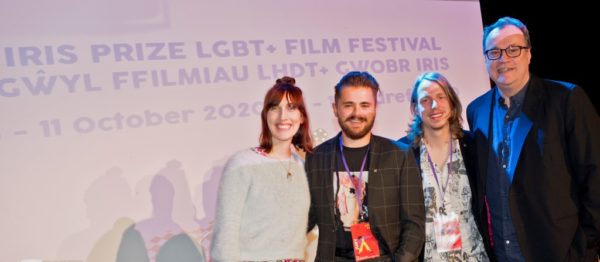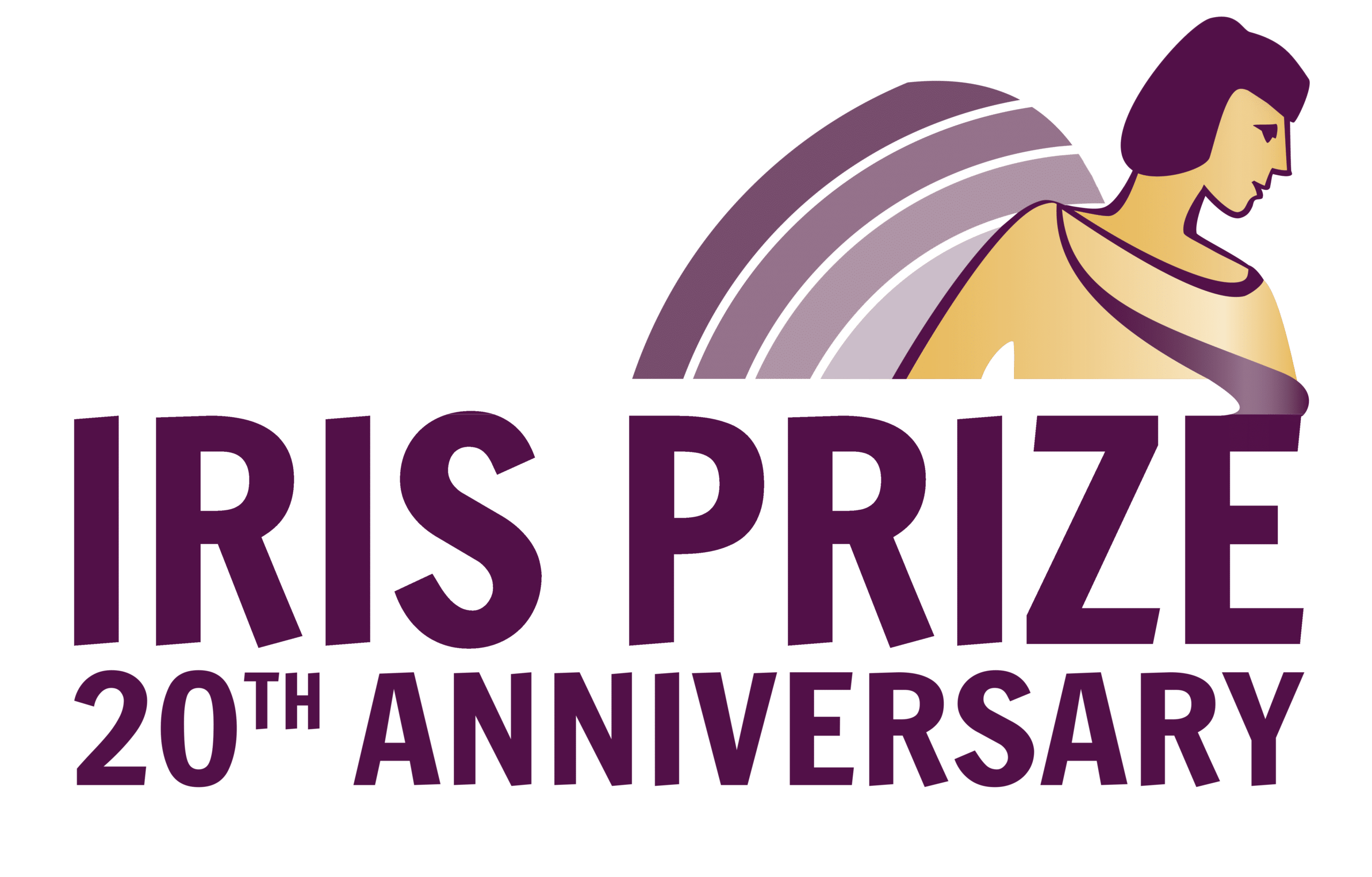Iris Prize sponsored by The Michael Bishop Foundation
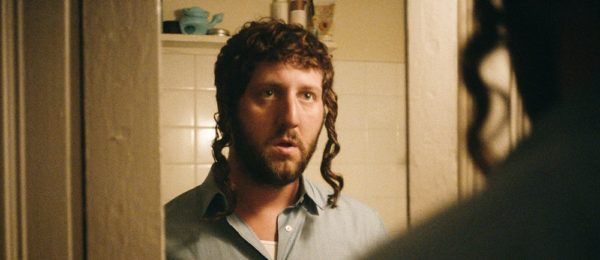 Black Hat, directed by US director Sarah Smith, has been announced by writer and producer Russell T Davies (Queer as Folk, Doctor Who, Years and Years) as the winner of Cardiff’s annual international LGBT+ short film award, the Iris Prize. Her film tells the story of a closeted Hasidic Jewish man living in Los Angeles and was a second nomination for Sarah and producer and writer Philip Guttman, who were shortlisted for their comedy D. Asian in 2015. She is the fourth woman to win the prize.
The £30,000 prize, supported by The Michael Bishop Foundation, allows Sarah to make another short film here in the UK. Eleven films have been produced by Iris Prize winners to date, the first being Colonial Gods, from Academy Award-nominated writer and director Dee Rees (Mudbound).
Black Hat, directed by US director Sarah Smith, has been announced by writer and producer Russell T Davies (Queer as Folk, Doctor Who, Years and Years) as the winner of Cardiff’s annual international LGBT+ short film award, the Iris Prize. Her film tells the story of a closeted Hasidic Jewish man living in Los Angeles and was a second nomination for Sarah and producer and writer Philip Guttman, who were shortlisted for their comedy D. Asian in 2015. She is the fourth woman to win the prize.
The £30,000 prize, supported by The Michael Bishop Foundation, allows Sarah to make another short film here in the UK. Eleven films have been produced by Iris Prize winners to date, the first being Colonial Gods, from Academy Award-nominated writer and director Dee Rees (Mudbound).
 Commenting on the three finalist, all directed by women, the jury chair Jake Graf commented:
Black Hat
"Black Hat shone a light on an often unseen community in a sensitive, tender and positive way, without casting judgement. We foudn the lead charming and likeable, the film visually stunning, and responded well to this perfectly crafted and concise work of art. Accomplished, enjoyable and captivating.
Marguerite
Almost universally, Marguerite elicited an unprecedented emotional response from our jury this year, with many of us in floods of tears. Not only did it depict a rarely seen and underrepresented section of our community, the older lesbian, but it did so with subtlety, empathy and charm. Marguerite herself was a revelation, and her face will stay with us for a long time to come. Stunning film-making indeed.
Ponyboi
Ponyboi was original, dreamlike, and once again a visual feast, showcasing a rarely seen character in our intersex lead. The performances were as strong as the cinematography, the characters as colourful as the neon lit launderette. Fresh, original film-making."
Commenting on the three finalist, all directed by women, the jury chair Jake Graf commented:
Black Hat
"Black Hat shone a light on an often unseen community in a sensitive, tender and positive way, without casting judgement. We foudn the lead charming and likeable, the film visually stunning, and responded well to this perfectly crafted and concise work of art. Accomplished, enjoyable and captivating.
Marguerite
Almost universally, Marguerite elicited an unprecedented emotional response from our jury this year, with many of us in floods of tears. Not only did it depict a rarely seen and underrepresented section of our community, the older lesbian, but it did so with subtlety, empathy and charm. Marguerite herself was a revelation, and her face will stay with us for a long time to come. Stunning film-making indeed.
Ponyboi
Ponyboi was original, dreamlike, and once again a visual feast, showcasing a rarely seen character in our intersex lead. The performances were as strong as the cinematography, the characters as colourful as the neon lit launderette. Fresh, original film-making."
BEST BRITISH AWARD sponsored by Pinewood Studios: My Brother is a Mermaid
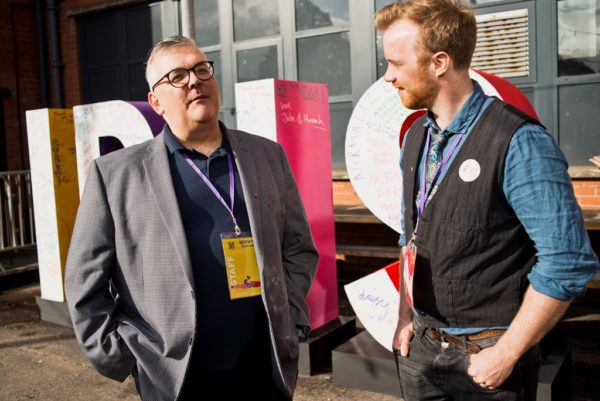 The winner of the Best British award, sponsored by Pinewood Studios, is My Brother is a Mermaid; a magic-realist story about a trans teen living in a dilapidated seaside community. The film, directed by Alfie Dale (pictured above with Berwyn Rowlands), was also the winner of both Cardiff University’s Iris Prize Youth Award and the Buzz Magazine Audience Award.
The winner of the Best British award, sponsored by Pinewood Studios, is My Brother is a Mermaid; a magic-realist story about a trans teen living in a dilapidated seaside community. The film, directed by Alfie Dale (pictured above with Berwyn Rowlands), was also the winner of both Cardiff University’s Iris Prize Youth Award and the Buzz Magazine Audience Award.
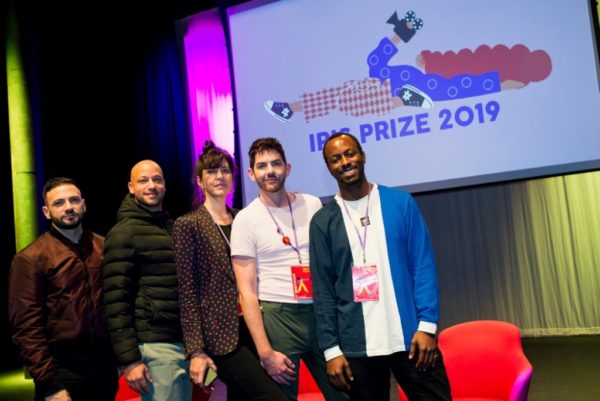 Commenting on the three finalist in the Best British category the jury commented:
My Brother is a Mermaid
Alfie Dale directs a remarkable cast that convey a beautiful blend of emotions. The viewer is pulled into the intimate world of Kuda, who watches as his sibling Kai journeys through finding the confidence to embrace their non-binary identity in a small seaside town where standing out often means being alienated. Alfie’s direction is sensitive and compassionate, pulling at the heartstrings without ever being overly sentimental. He takes us on a journey of character growth and development across twenty minutes that more accomplished directors too often fail to do in two hours. Quite simply outstanding.
Invisible Women
Director Alice Smith presents an engrossing documentary that never fails to uplift the queer spirit as we follow the journey of Angela Cooper and Luchia Fitzgerald, two lesbians whose work established the northern branch of the Gay Liberation Front in the UK, setup the UK’s second women’s refuge for victims of abuse, and established printing presses to share information not just for LGBTQ activists but also the UK Black Panthers. A rousing call to arms overflowing with energy and defiance, it brilliantly channels the spirit of defiance from the 70s and 80s when early queer activism was taking root.
We Are Dancers
A frightening insight into the imagined world of Hansi Strum. Strum was a real life cabaret performer whose fate is known beyond the rise of the Nazi in 1933. Writer/director Joe Morris re-imagines those last days as Strum is conflicted between fleeing with his younger queer friends or standing defiant in the face of an all too familiar threat of self-loathing from within his own gay circle. Richly visualised, its aesthetic is vivid and bold, evoking Strum’s own unapologetic character. Parallels to the polarizing world that we find ourselves in today are scarily apparent. We Are Dancers is a warning shot about the terrifying prospect of history repeating.
Commenting on the three finalist in the Best British category the jury commented:
My Brother is a Mermaid
Alfie Dale directs a remarkable cast that convey a beautiful blend of emotions. The viewer is pulled into the intimate world of Kuda, who watches as his sibling Kai journeys through finding the confidence to embrace their non-binary identity in a small seaside town where standing out often means being alienated. Alfie’s direction is sensitive and compassionate, pulling at the heartstrings without ever being overly sentimental. He takes us on a journey of character growth and development across twenty minutes that more accomplished directors too often fail to do in two hours. Quite simply outstanding.
Invisible Women
Director Alice Smith presents an engrossing documentary that never fails to uplift the queer spirit as we follow the journey of Angela Cooper and Luchia Fitzgerald, two lesbians whose work established the northern branch of the Gay Liberation Front in the UK, setup the UK’s second women’s refuge for victims of abuse, and established printing presses to share information not just for LGBTQ activists but also the UK Black Panthers. A rousing call to arms overflowing with energy and defiance, it brilliantly channels the spirit of defiance from the 70s and 80s when early queer activism was taking root.
We Are Dancers
A frightening insight into the imagined world of Hansi Strum. Strum was a real life cabaret performer whose fate is known beyond the rise of the Nazi in 1933. Writer/director Joe Morris re-imagines those last days as Strum is conflicted between fleeing with his younger queer friends or standing defiant in the face of an all too familiar threat of self-loathing from within his own gay circle. Richly visualised, its aesthetic is vivid and bold, evoking Strum’s own unapologetic character. Parallels to the polarizing world that we find ourselves in today are scarily apparent. We Are Dancers is a warning shot about the terrifying prospect of history repeating.
FEATURE FILM AWARDS
